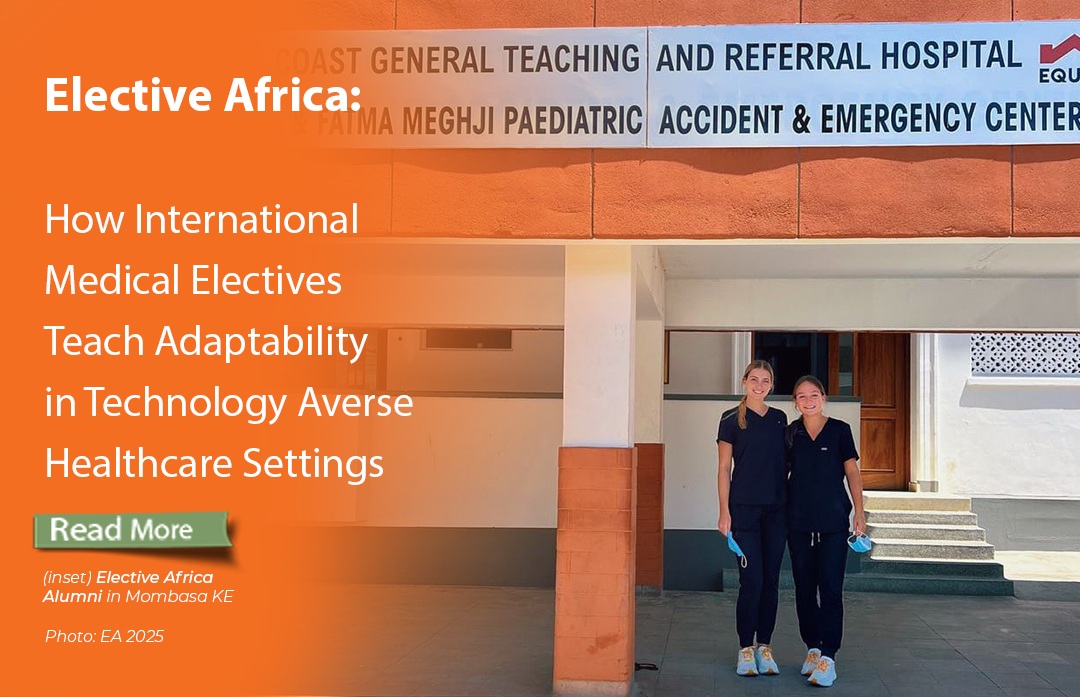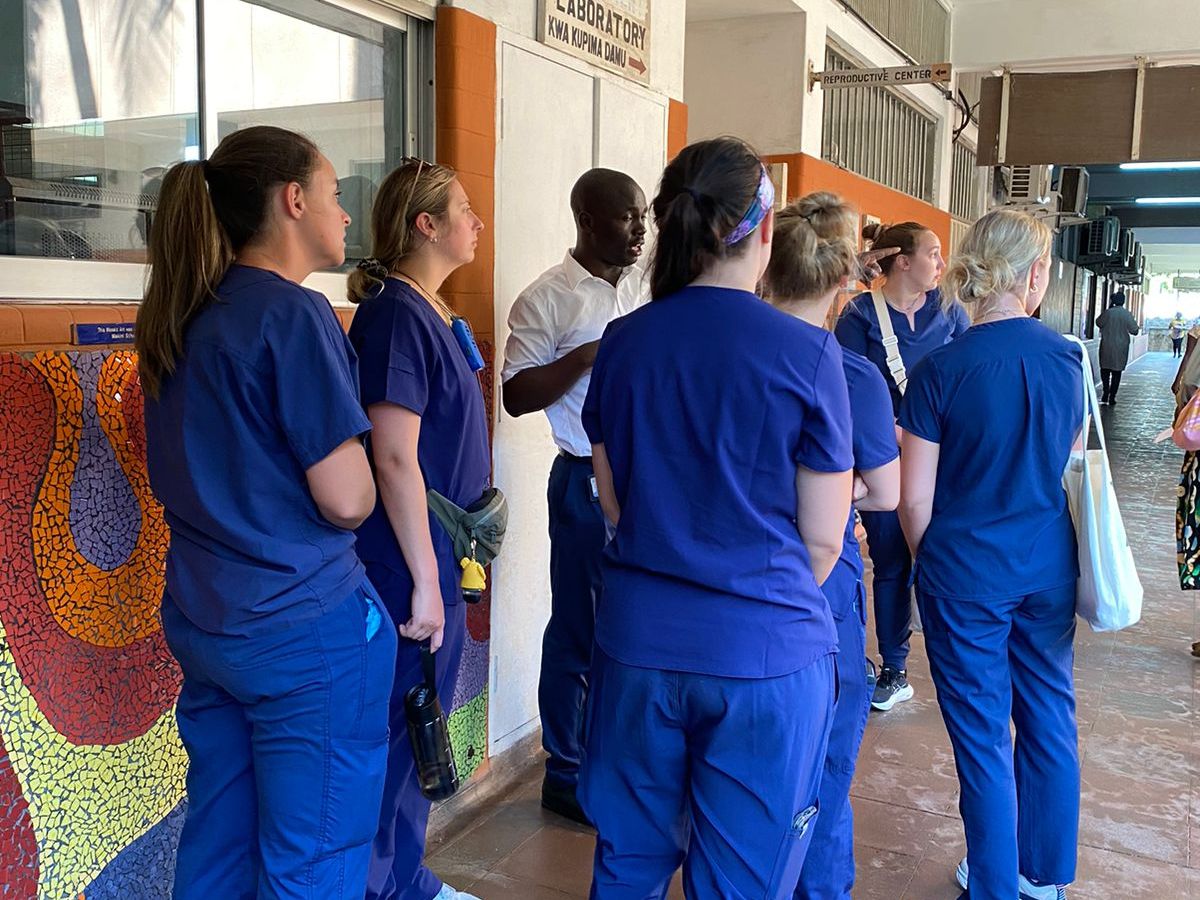 Visit Elective Africa website Visit Elective Africa website
|


|
|
|
| How International Medical Electives Teach Adaptability in Healthcare Settings with Limited Technology Reliance |
 |
|
In an era where technology is transforming modern medicine at a rapid pace, it’s easy to forget that not every healthcare system has the luxury of instant imaging or other advanced medical equipment. For many communities around the world, healthcare delivery still depends on resourcefulness, human intuition and collaborative teamwork. As medical students, you are constantly learning how to think critically, interpret data and navigate complex clinical scenarios. But what happens when you're placed in a hospital where advanced technology is limited? How do you assess a patient when imaging isn’t readily available or lab results take hours if not days to return? Participating in an international medical elective in a resource-limited setting is one of the most effective ways to build adaptability. Elective Africa’s medical electives programs in Kenya and Tanzania offer medical students a rare and valuable opportunity to step into healthcare systems that function with limited technological resources. In these settings, clinical acumen, resourcefulness and teamwork often outweigh reliance on machines. Whether you will be rotating in internal medicine, pediatrics, surgery or obstetrics, you will experience firsthand how healthcare providers deliver quality care by leaning heavily on foundational clinical skills. Back to top |
| Learning to Rely on Clinical Judgment |
 |
|
In many Western healthcare environments, healthcare providers are accustomed to using advanced diagnostic tools to guide patient care. But what happens when these tools aren't available? One of the most impactful lessons students learn during their international medical electives in countries like Kenya and Tanzania is how to think critically and rely more on clinical judgement than machines. In many departments at Coast General Teaching and Referral Hospital (Mombasa) or Mount Meru Regional Hospital (Arusha), doctors work with limited access to advanced imaging or lab diagnostics. During your rotations, you are encouraged to sharpen your observation and communication skills by listening closely to patient histories, recognizing subtle physical signs and understanding how a thorough physical exam can guide decision making. This shift away from constant reliance on technology builds a deeper appreciation for the fundamentals of medicine. It challenges you to slow down, think more intentionally and engage with cases in a way that strengthens your clinical judgment.
Back to top
|
| Cultivating a Global Health Perspective |
 |
|
Adaptability isn't just about working without machines, it's also about understanding why systems operate differently and how to adjust one's expectations and practices in diverse environments. Through guided global health tutorials and debriefing sessions during your elective program, you are encouraged to reflect on healthcare infrastructure, policy and public health challenges in developing nations. By working alongside local healthcare teams, you will witness the impact of social determinants of health and how communities and hospitals manage various healthcare issues like chronic disease, infectious outbreaks, maternal health and surgical needs without extensive technological resources. This firsthand exposure not only broadens your clinical perspective but also deepens your understanding of the interconnectedness between medicine, culture, infrastructure and policy. You'll leave with more than just stories but also with a deeper appreciation for the resilience of healthcare systems operating with minimal resources and the ability to adapt to any clinical environment with confidence, compassion and creativity. Back to top |
| Building Resilience and Professional Growth |
 |
|
Limited-technology healthcare settings often require creative thinking and resilience. In these environments, you quickly learn how to stay calm when things get unpredictable, make quick decisions and gain a deep respect for the resourcefulness of local medical teams.
Many past participants of Elective Africa’s electives report that these experiences have positively influenced their approach to patient care, reinforced their commitment to medicine and helped them stand out in residency applications and interviews. Being able to talk about adapting in low-resource settings, collaborating across cultures and learning from doctors in environments with minimal technology demonstrates not only clinical awareness but also a readiness to face diverse healthcare challenges. Back to top |
| Mentorship and Collaborative Problem-Solving |
 |
|
A unique aspect of Elective Africa’s programs is the emphasis on mentorship. Interns are paired with hospital-based mentors who guide you through each department, discuss case management strategies and highlight the importance of adaptable care models. Many mentors have spent years working in low-resource settings and their approach to medicine will provide you with real clinical examples of how to deliver high-quality care despite limitations. Whether rotating in emergency rooms, outpatient clinics or surgical theaters, you will observe how interdisciplinary collaboration and effective communication become essential when resources are scarce. These experiences also highlight the importance of preventive care and community health, where the focus shifts from treating illness to addressing root causes and promoting long term well-being in underserved populations. Back to top |
| Elective Africa’s Role in Facilitating Adaptive Learning |
 |
|
Elective Africa’s international medical electives are thoughtfully tailored to provide each individual student with hands-on experience in real hospital environments across East Africa. From the moment you arrive, you’ll be welcomed with a thorough hospital orientation that helps you adjust to the local healthcare setting. Interns are paired with seasoned mentors who offer guidance and support throughout the experience across various hospital departments. Rotations are designed to be flexible, allowing you to focus on areas of personal interest and specialty. Whether you’re working in emergency care, pediatrics or surgery, you will gain practical exposure to the day-to-day challenges of healthcare in resource-limited environments. The goal is to provide a dynamic learning experience that not only improves your clinical skills but also emphasizes resilience, adaptability and cultural awareness, qualities essential for any aspiring healthcare professional. Back to top |
| Conclusion |
 |
|
International medical electives in settings with limited technology offer far more than medical knowledge, they teach adaptability, resilience and critical thinking. By participating in a medical electives program with Elective Africa, you will prepare yourself not just residency applications, but for the real-world demands of a global healthcare landscape. In an age where technological advancement is often equated with progress, these experiences serve as a humbling reminder that the heart of medicine lies in human connection, thoughtful care, and the ability to adapt to any clinical environment. If you're a medical student looking for an elective experience that will challenge you and strengthen your clinical skills, apply to speak with an Elective Africa advisor and start planning a placement that will shape your future in medicine. Back to top |
|
|

 4 2025
4 2025